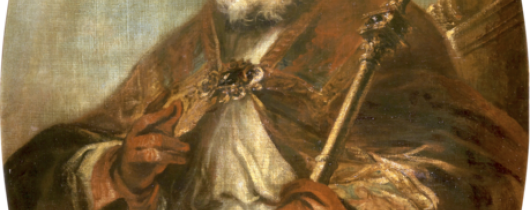Selflessness and Self-Control | Desinterés y Autocontrol

St. Leo the Great, Pope & Doctor
Titus 2:1-8, 11-14; Luke 17:7-10
There are very few saints given the added title “the Great.” Today we remember one of them. Pope Leo served the Church at a perilous time in her history. It was a time that demanded spiritual strength, pragmatism, and diplomacy.
Spiritually, Pope Leo fought against the heresies of Pelagianism (which rejected the reality of original sin and our need for God’s grace) and Manichaeism (which held that matter, including our bodies and the created world, is evil). At the Council of Chalcedon (451) he defended the doctrine that Jesus was both fully human and fully divine—something we now profess as part of our “Nicene” Creed. He also strongly promoted papal primacy not only as an assertion of his power but more fundamentally as a locus of the Church’s unity and ultimately its catholicity.
Pope Leo saved Rome by limiting the damage done to the city and its people by the Hun and Vandal invaders. He essentially cut a deal with them.
He was far from perfect, but he combined the self-discipline St. Paul promotes in his Letter to Titus with the spirit of selfless service Jesus describes in today’s gospel reading at a time when the Church desperately needed those gifts. The Church still needs them.
***
San León el Grande, Papa y Doctor
Tito 2:1-8, 11-14; Lucas 17:7-10
Hay muy pocos santos a los que se les ha añadido el título de "El Grande". Hoy recordamos a uno de ellos. El Papa León sirvió a la Iglesia en un momento peligroso de su historia. Fue un tiempo que exigió fuerza espiritual, pragmatismo y diplomacia.
Espiritualmente, el Papa León luchó contra las herejías del Pelagianismo (que rechazaba la realidad del pecado original y nuestra necesidad de la gracia de Dios) y el Maniqueísmo (que sostenía que la materia, incluyendo nuestros cuerpos y el mundo creado, es maligna). En el Concilio de Calcedonia (451) defendió la doctrina de que Jesús era a la vez plenamente humano y plenamente divino, algo que ahora profesamos como parte de nuestro Credo "Niceno". También promovió firmemente la primacía papal no sólo como una afirmación de su poder, sino más fundamentalmente como un lugar de unidad de la Iglesia y, en última instancia, de su catolicidad.
El Papa León salvó a Roma limitando el daño hecho a la ciudad y a su gente por los invasores Hunos y Vándalos. Esencialmente hizo un trato con ellos.
Estaba lejos de ser perfecto, pero combinó la autodisciplina que San Pablo promueve en su Carta a Tito con el espíritu de servicio desinteresado que Jesús describe en la lectura del evangelio de hoy en un momento en que la Iglesia necesitaba desesperadamente esos dones. La Iglesia todavía los necesita.
- Capuchin Friar John Celichowski, OFM Cap.




